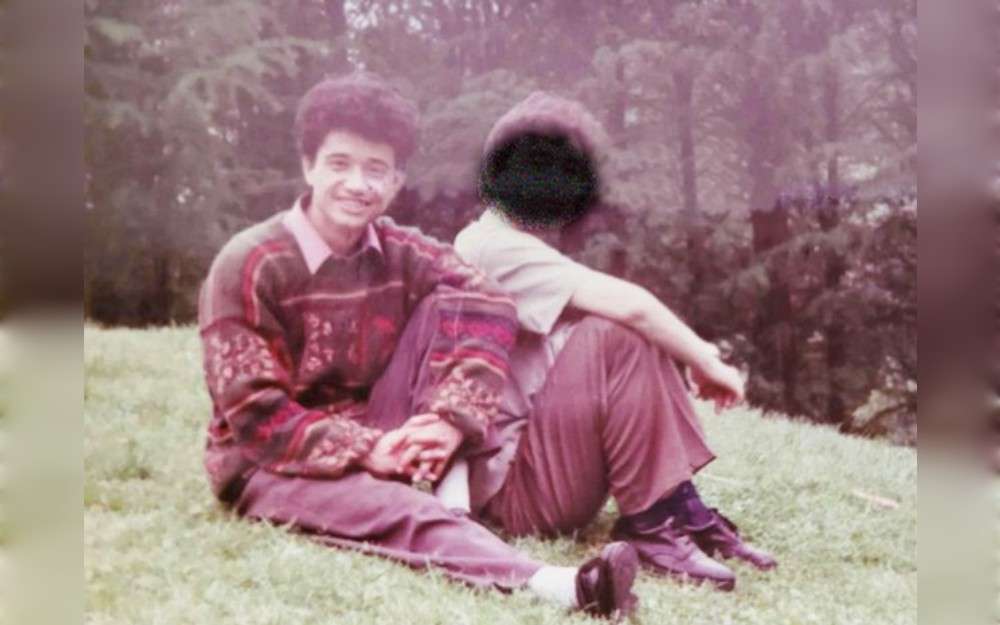He was arrested despite his stellar reputation as a teacher.
By Shohret Hoshur for RFA Uyghur

Erkin Tewekkul, a Uyghur biology teacher at a school in Xinjiang’s capital Urumqi, stood out among his peers for his excellent communication and leadership skills.
He was selected several times as teacher or school staffer of the year and promoted first to secretary of the school union committee and later to principal, according to people familiar with his background.
Yet, despite his stellar reputation at the No. 14 High School — one of the top Uyghur high schools in Urumqi known for its outstanding graduates — police summoned Tewekkul for questioning around mid-2017. They arrested him later that year and sentenced him to 12 years in prison, the sources said.
Tewekkul, now 54, was arrested because authorities said he “failed to excessively praise” the Chinese Communist Party, or CCP, and the government while in class and in school meetings, raising doubts about his loyalty to the state, said one source, who declined to be named for fear of reprisal.
He was charged with “supporting nationalist separatists” after comforting students whose parents had been detained by authorities, and in 2018 was also accused of being “two-faced” — a term used by the CCP to describe Uyghur cadres deemed disloyal to the party — the source said.
Mass arrests
Tewekkul’s detention occurred amid the mass arrests of Uyghurs in Xinjiang, hundreds of thousands of whom were sent to “re-education” camps to purportedly eliminate their “terrorist” tendencies and “religious extremism.” Others were sent to prisons.
Authorities began jailing Uyghur intellectuals and teachers a couple of years before conducting mass arrests around 2017 and continued to do so afterward as part of the Chinese government’s efforts to suppress Xinjiang’s Uyghur population.
“Most of the people accused of being two-faced are Uyghur cadres who pay attention to Uyghur culture, virtue and education, and who work for the government,” said Abduweli Ayup, founder of Uyghur Hjelp. Also known as Uyghuryar, the Norway-based nonprofit engages in Uyghur human rights advocacy, documentation and humanitarian aid.
“Therefore, as someone who cared for his students, loved education and contributed to biology in the Uyghur language, I can understand the reason [authorities accused] him of being two-faced,” he said.
Around 2014, Tewekkul began to notice that some of the high school students became depressed after their parents were arrested.
These earlier arrests were part of a crackdown on Muslim Uyghurs by Chinese authorities who appointed party cadres to stay in Uyghur homes and report on perceived “extremist” behaviors, including fasting during the holy month of Ramadan.
At the time, authorities leveled thousands of mosques throughout Xinjiang that they claimed were poorly constructed and unsafe. Government officials in Urumqi began a campaign against halal food, which is prepared according to Islamic law.
Uyghur women were subjected to forced sterilizations and the insertion of intrauterine devices or detained for violating birth-control orders.
Amid the crackdown, Tewekkul called the depressed students into his office and suggested that the suppressive measures were only temporary, according to one person with knowledge of the situation.
He assured them that their parents were innocent and would eventually be vindicated, the source said.
Interrogation
During Tewekkul’s interrogation three years later, authorities misrepresented his words, saying they demonstrated an “uncertain position on national issues,” and that he was “covering for separatists” and “inciting their children,” the person familiar with the situation said.
These statements were later introduced in political study sessions as “the manifestation of national separatism in the field of education,” he added.
When contacted by RFA for more information, a staffer at the 14th High School said he had no knowledge of Tewekkul and suggested that the former principal left the school years ago.
An officer at the Ghalibiyet Police Station, which oversees the district where the school is located in Urumqi, said the current principal was a Han Chinese man and that Tewekkul had been “taken away for re-education.”
“I don’t know how long it’s been since he stopped working — maybe around three years,” she said. “I don’t know the reason for his arrest,” she added, referring further questions to school leaders.
A police officer at the Tengritagh District Police Department in Urumqi confirmed that Tewekkul was in prison but said she could not provide information about the duration of his sentence or his location.
“I heard that he was arrested due to financial reasons, since he was a principal,” she told RFA. “I didn’t hear about him being arrested for comforting students.”
Tewekkul graduated from North China University with a degree in biology in 1994 and began working as a teacher at a former school that was renamed the No. 14 High School in 2004, Ayup said.
The principal is on a list of detained intellectuals compiled by Ayup’s organization.
Tewekkul’s friends and former classmates said he loved art and calligraphy, and was especially good at drawing, according to Ayup.
Former students now living abroad said he cared deeply about the students, loved education and offered valuable advice about the future, he added.
Translated by RFA Uyghur. Edited by Roseanne Gerin and Joshua Lipes.
“Copyright © 1998-2023, RFA.
Used with the permission of Radio Free Asia,
2025 M St. NW, Suite 300, Washington, D.C. 20036.
https://www.rfa.org.”














